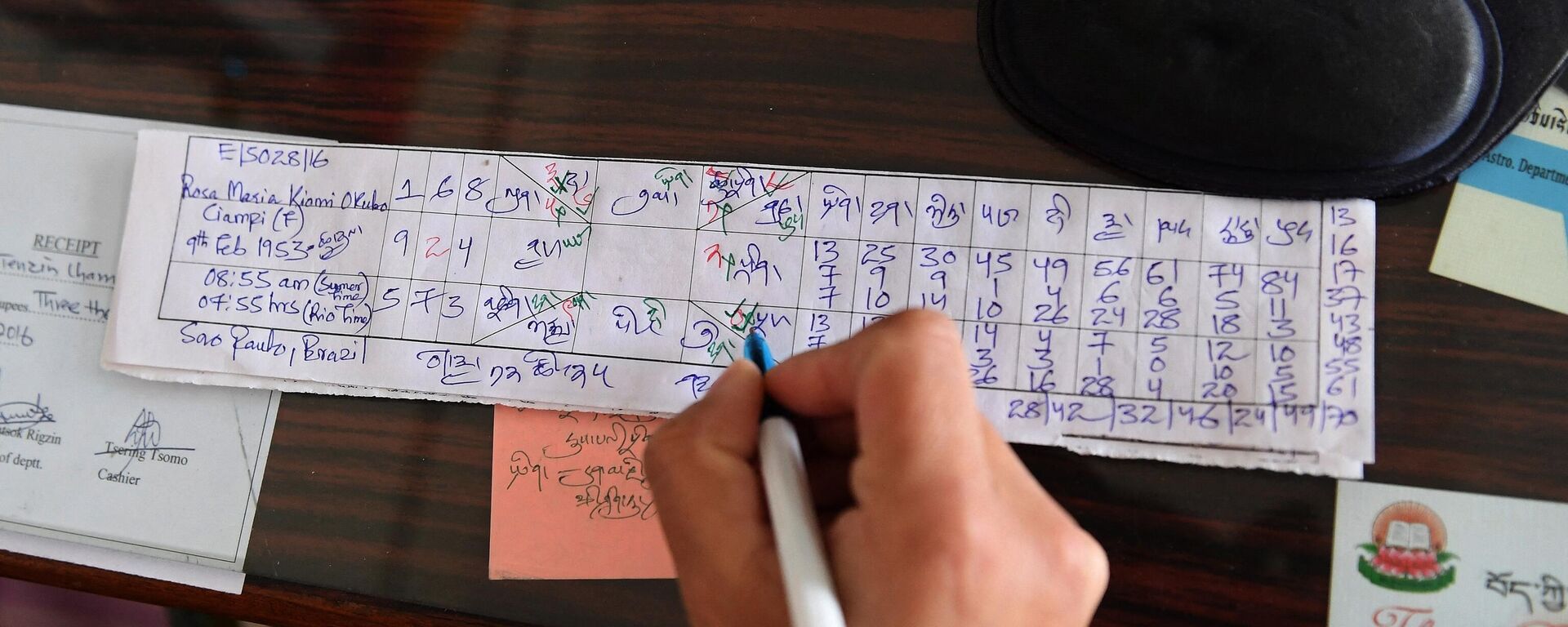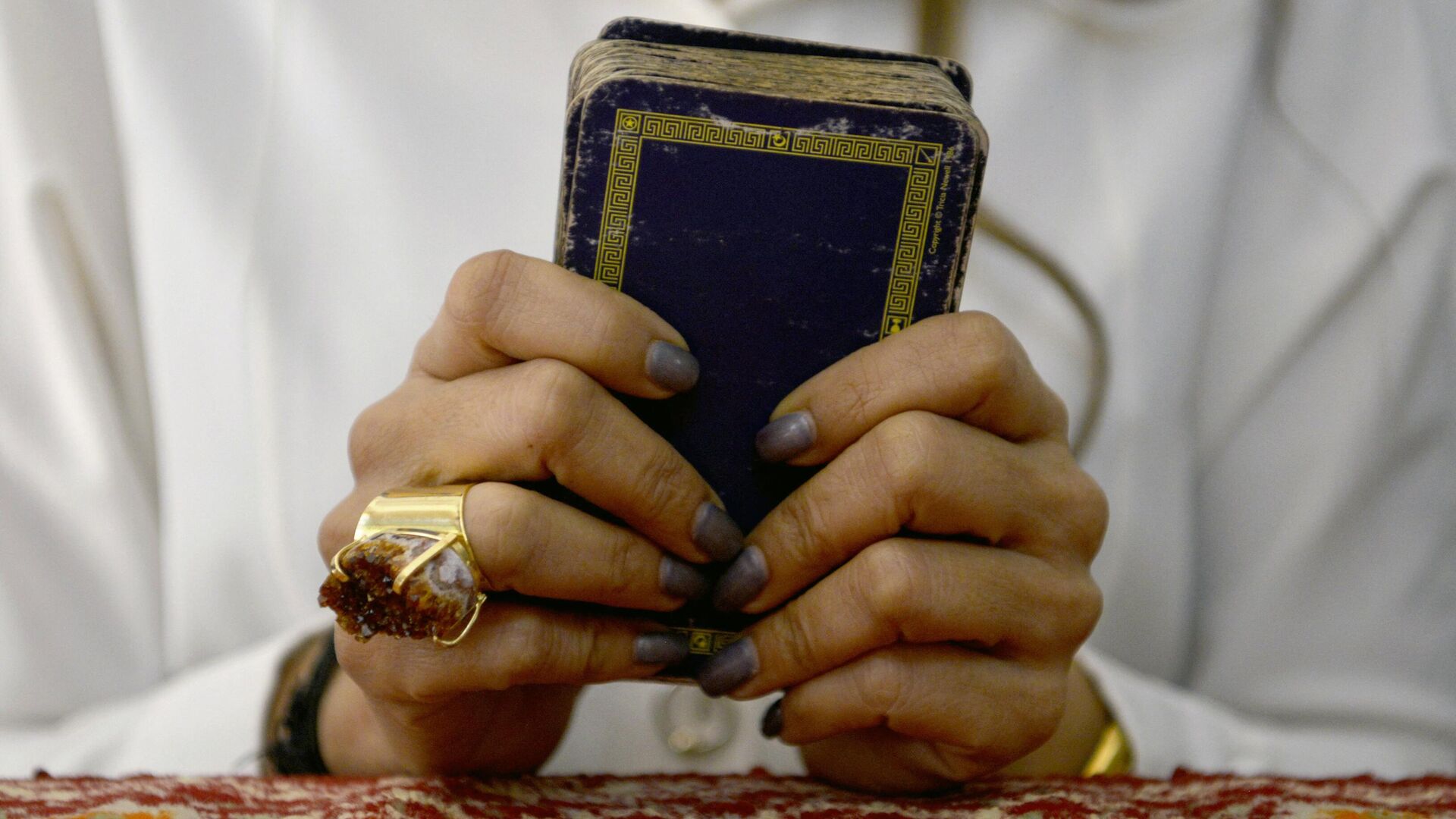https://sputnikglobe.com/20221026/indian-astrology-app-founder-shares-top-queries-during-pandemic-1102613458.html
Indian Astrology App Founder Shares Top Queries During Pandemic
Indian Astrology App Founder Shares Top Queries During Pandemic
Sputnik International
Even before the pandemic, India’s spiritual market was a booming industry: researchers estimate it could be worth $40Bln by 2027, and the number of practicing... 26.10.2022, Sputnik International
2022-10-26T09:29+0000
2022-10-26T09:29+0000
2022-10-26T09:29+0000
india
astrology
prophecy
startup
indians
pandemic
https://cdn1.img.sputnikglobe.com/img/07e6/0a/1a/1102664343_0:217:3255:2048_1920x0_80_0_0_a6f6390e8c1441feaf38819bb9005cf5.jpg
Astrology services is nothing new to India -- for centuries, Indians approached fortunetellers seeking solutions to their personal issues. However, in giving a new spin to a traditional industry, Puneet Guptam - an Indian tech entrepreneur - launched his 'Astrotalk' app five years ago and now it is a unicorn (worth $1Bln), with more than 10Mln downloads. The app earns Gupta 9Mln rupees ($108,000) per day, and its monthly growth is around 10 to 12 percent.With Astrotalk acquiring its own niche in the Indian market, Gupta faced many 'ifs' and 'buts', namely will people turn to the “new-generation Astro”?Sputnik quizzed Gupta to learn the answer to this question.Sputnik: Astrology is known to be a traditional business — what made you think people would switch to an online astrology service?Puneet Gupta: I was working with an investment bank in 2015. I was planning to start something of my own at that time. But then my colleague - who also happened to be an astrologer - predicted that the start-up wouldn’t work two years after launch as my co-founder would leave it.As I didn’t believe in astrology then, I ignored my friend’s advice and even asked her how an educated person such as her could believe in astrology.In 2017, when my co-founder left, I was stunned. And the idea came to me: if an astrologer can really predict so accurately, why not explore this as an idea?At that time, I agreed that a good astrologer could answer our questions correctly.I did research and conducted a survey about my product too. In 2017, none of the astrology apps available on the market were user-friendly and had very low success rates. When I talked to my friends about astrology products, most were curious and downloaded the app, and then shared feedback. It made me believe that there was demand for the product.Sputnik: How was the journey after starting the app and what have you learnt?Puneet Gupta: When I launched this app, we were ready to handle basic questions such as those about love life, career, relationship, health, etc.But eventually, we realized that a few calls would last for up to two hours. We saw that clients would share all their problems with the astrologers, including psychological ones. And they were looking for solutions for mental health problems, which included counseling and future hopes.Most of these customers returned and wanted to talk only to those experts (the ones they talked to before). And our business [was] built on this concept later on.Sputnik: When you say that clients prefer to share their psychological issues with astrologers, another issue emerges: we have witnessed many incidents (offline) when people turned to astrologers in vulnerable situations and they would be taken advantage of - either monetarily, or in some other ways. What is your take on that?Puneet Gupta: Our app has many terms and conditions for astrologers. Astrologers know their limits. If they see something dark happening in the life of their customers, they handle it [in the most diplomatic way possible] and sometimes, even refuse to make a prediction.In offline scenes, an astrologer might play with the customer's mind and can even threaten the customer after gaining his or her trust. In our app, we ensure that our astrologers do not sell costly things; even if the astrologer recommends buying some stone, we ensure that astrologers do this only rarely.In our case, in the beginning, when customers start using our app, they begin with basic questions about career and finance. It is only after three or four consultations that customers open up and share their problems.Sputnik: Did you observe any changes in astrological queries during the COVID-19 pandemic?Puneet Gupta: Before COVID-19, most of the questions were about relationships, love life and marriage. However, during COVID-19 and since people are asking more questions about career, business and finance.Sputnik: Is your app available outside India and if yes, could you share what foreigners want to know more about?Puneet Gupta: We’ve many Non-Resident Indian (NRI) customers, but not foreigners. Although, we will be launching outside India.The basic problem we have is that while talking to astrologers everyone wants experts who can communicate in their native language.Sputnik: Do you think you could take away the business of offline astrologers?Puneet Gupta: That’s not possible. We can’t break or spoil anyone’s clientele. And no one can break ours. If a client develops trust in an astrologer, they will always seek the same astrologer's advice rather than try a new one. In our case too, more than 83 percent of the business comes from repeat users. Had we given bad advice, these people would have never come back.And, we’re a very new industry. Most of our users are from the biggest cities only, not even tier-two cities. Hence, our penetration at this moment is limited even in Indian cities.And most importantly, we get most of the revenue from the chat business, ie 65 percent whereas voice calls represent 35 percent, which clearly indicates that these people would want advice in disguise. I doubt whether any of our customers would want to meet their astrologer face-to-face.
https://sputnikglobe.com/20221010/from-pandemic--political-shifts-to-marriage--career-pundits-explain-drive-for-astrology-in-india-1101665960.html
Sputnik International
feedback@sputniknews.com
+74956456601
MIA „Rossiya Segodnya“
2022
Deexa Khanduri
https://cdn1.img.sputnikglobe.com/img/07e4/0c/1e/1081607388_0:0:961:960_100x100_80_0_0_e9e931b8c1e18fb41f3074e2145d7a3a.jpg
Deexa Khanduri
https://cdn1.img.sputnikglobe.com/img/07e4/0c/1e/1081607388_0:0:961:960_100x100_80_0_0_e9e931b8c1e18fb41f3074e2145d7a3a.jpg
News
en_EN
Sputnik International
feedback@sputniknews.com
+74956456601
MIA „Rossiya Segodnya“
Sputnik International
feedback@sputniknews.com
+74956456601
MIA „Rossiya Segodnya“
Deexa Khanduri
https://cdn1.img.sputnikglobe.com/img/07e4/0c/1e/1081607388_0:0:961:960_100x100_80_0_0_e9e931b8c1e18fb41f3074e2145d7a3a.jpg
india, astrology, prophecy, startup, indians, pandemic
india, astrology, prophecy, startup, indians, pandemic
Indian Astrology App Founder Shares Top Queries During Pandemic
Deexa Khanduri
Sputnik correspondent
Even before the pandemic, India’s spiritual market was a booming industry: researchers estimate it could be worth $40Bln by 2027, and the number of practicing astrologers in the country is estimated to be approximately 2Mln.
Astrology services is nothing new to India -- for centuries, Indians approached fortunetellers seeking solutions to their personal issues.
However, in giving a new spin to a traditional industry, Puneet Guptam - an Indian tech entrepreneur - launched his 'Astrotalk' app five years ago and now it is a unicorn (worth $1Bln), with more than 10Mln downloads. The app earns Gupta 9Mln rupees ($108,000) per day, and its monthly growth is around 10 to 12 percent.
With Astrotalk acquiring its own niche in the Indian market, Gupta faced many 'ifs' and 'buts', namely will people turn to the “new-generation Astro”?
Sputnik quizzed Gupta to learn the answer to this question.
Sputnik: Astrology is known to be a traditional business — what made you think people would switch to an online astrology service?
Puneet Gupta: I was working with an investment bank in 2015. I was planning to start something of my own at that time. But then my colleague - who also happened to be an astrologer - predicted that the start-up wouldn’t work two years after launch as my co-founder would leave it.
As I didn’t believe in astrology then, I ignored my friend’s advice and even asked her how an educated person such as her could believe in astrology.
In 2017, when my co-founder left, I was stunned. And the idea came to me: if an astrologer can really predict so accurately, why not explore this as an idea?
At that time, I agreed that a good astrologer could answer our questions correctly.
Today, youngsters have hundreds of problems and feel trapped because of them. Today, youths are ready to pay money if anyone can give them hope that there is a solution to their problems. If you look at data for our app, the main demographic for using our app are between 23 and 35 years old.
I did research and conducted a survey about my product too.
In 2017, none of the astrology apps available on the market were user-friendly and had very low success rates.
When I talked to my friends about astrology products, most were curious and downloaded the app, and then shared feedback. It made me believe that there was demand for the product.
Sputnik: How was the journey after starting the app and what have you learnt?
Puneet Gupta: When I launched this app, we were ready to handle basic questions such as those about love life, career, relationship, health, etc.
But eventually, we realized that a few calls would last for up to two hours. We saw that clients would share all their problems with the astrologers, including psychological ones. And they were looking for solutions for mental health problems, which included counseling and future hopes.
In India, people avoid visiting psychologists. But people wanted to share their life problems, and it was easier for them to talk to astrologers. They believed astrologers could offer the solution to their problems.

10 October 2022, 13:33 GMT
Most of these customers returned and wanted to talk only to those experts (the ones they talked to before). And our business [was] built on this concept later on.
Sputnik: When you say that clients prefer to share their psychological issues with astrologers, another issue emerges: we have witnessed many incidents (offline) when people turned to astrologers in vulnerable situations and they would be taken advantage of - either monetarily, or in some other ways. What is your take on that?
Puneet Gupta: Our app has many terms and conditions for astrologers. Astrologers know their limits. If they see something dark happening in the life of their customers, they handle it [in the most diplomatic way possible] and sometimes, even refuse to make a prediction.
For example, if someone asks an astrologer to predict their death, the astrologer is not allowed to discuss such a thing on our platform.
In offline scenes, an astrologer might play with the customer's mind and can even threaten the customer after gaining his or her trust. In our app, we ensure that our astrologers do not sell costly things; even if the astrologer recommends buying some stone, we ensure that astrologers do this only rarely.
In our case, in the beginning, when customers start using our app, they begin with basic questions about career and finance. It is only after three or four consultations that customers open up and share their problems.
Sputnik: Did you observe any changes in astrological queries during the COVID-19 pandemic?
Puneet Gupta: Before COVID-19, most of the questions were about relationships, love life and marriage. However, during COVID-19 and since people are asking more questions about career, business and finance.
Sputnik: Is your app available outside India and if yes, could you share what foreigners want to know more about?
Puneet Gupta: We’ve many Non-Resident Indian (NRI) customers, but not foreigners. Although, we will be launching outside India.
The basic problem we have is that while talking to astrologers everyone wants experts who can communicate in their native language.
Sputnik: Do you think you could take away the business of offline astrologers?
Puneet Gupta: That’s not possible. We can’t break or spoil anyone’s clientele. And no one can break ours. If a client develops trust in an astrologer, they will always seek the same astrologer's advice rather than try a new one.
In our case too, more than 83 percent of the business comes from repeat users. Had we given bad advice, these people would have never come back.
And, we’re a very new industry. Most of our users are from the biggest cities only, not even tier-two cities. Hence, our penetration at this moment is limited even in Indian cities.
And most importantly, we get most of the revenue from the chat business, ie 65 percent whereas voice calls represent 35 percent, which clearly indicates that these people would want advice in disguise. I doubt whether any of our customers would want to meet their astrologer face-to-face.



